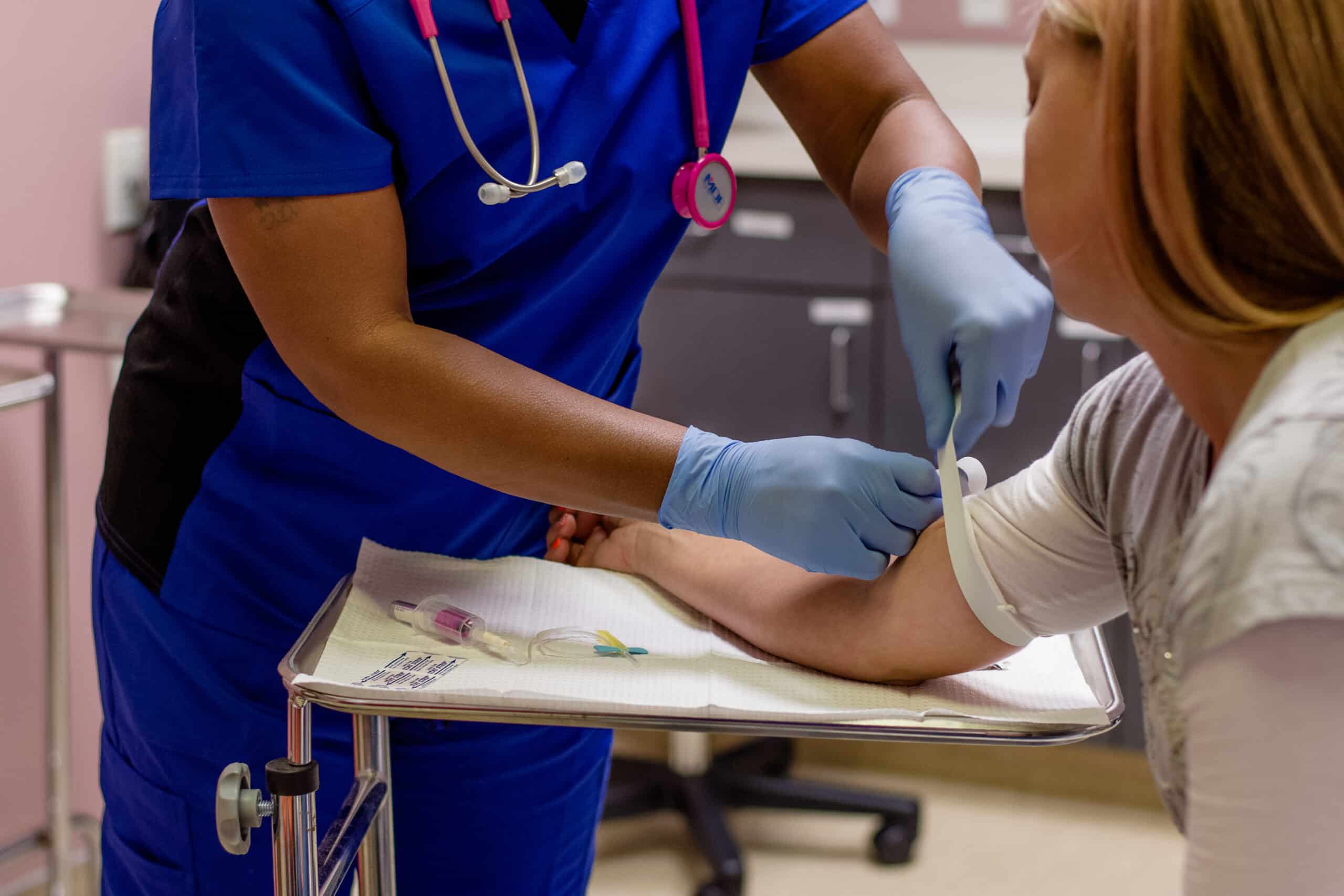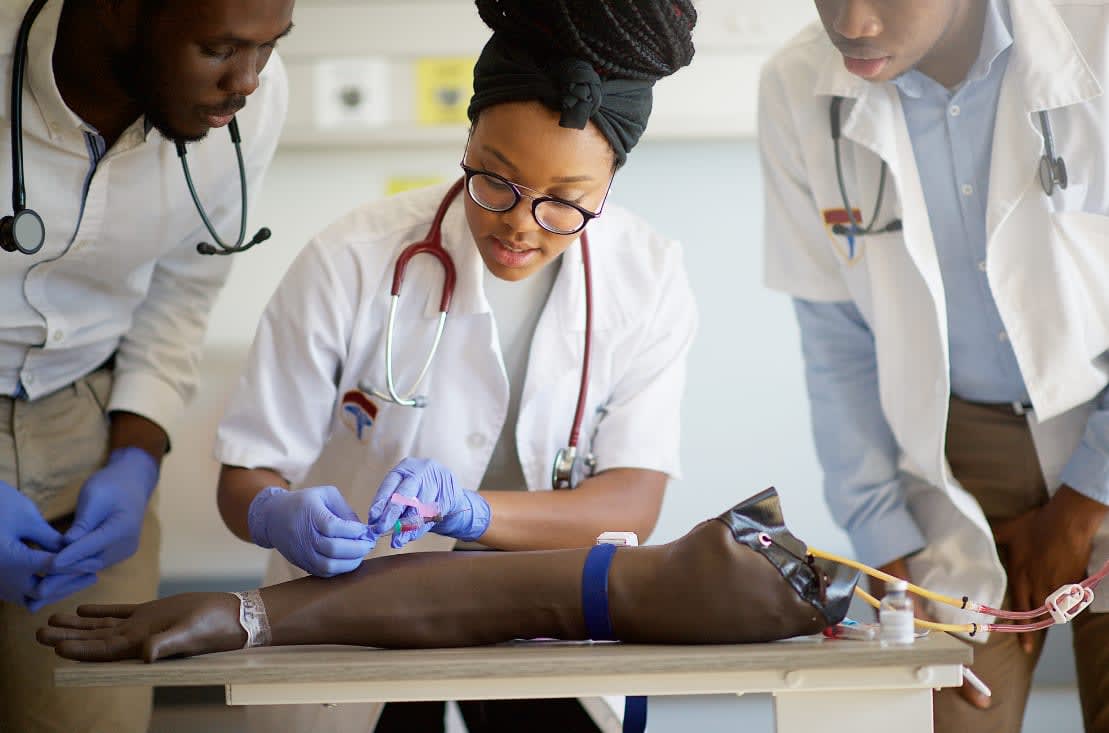What You Required to Know Prior To Starting a Phlebotomy Training Course for Future Success
Prior to you begin a phlebotomy training program, it's essential to recognize what the role requires and the skills you'll require to be successful. Looking into accredited programs can set the foundation for your education, yet don't overlook the relevance of hands-on experience and interpersonal abilities. You'll also want to consider qualification requirements particular to your state. What should you prioritize in your preparation? Allow's discover the vital aspects that can shape your future in this area. Phlebotomy Classes Near Me.
Understanding the Function of a Phlebotomist
Phlebotomists play a crucial role in the health care system, as they are in charge of injuring samples for examinations, transfusions, or contributions. You'll discover on your own operating in various settings, like health centers, centers, and labs, where accuracy and professionalism are essential. Daily, you'll interact with clients, explaining procedures to relieve their stress and anxiety, which helps build trust fund and relationship.
Your jobs consist of preparing tools, keeping a clean and sterile atmosphere, and ensuring exact labeling and documentation of samples. You'll also need to stay upgraded on safety methods and laws, as patient safety and security is non-negotiable. Phlebotomists typically team up with various other health care professionals, adding to accurate medical diagnoses and effective therapy strategies.
In this duty, you should be detail-oriented and efficient, in addition to have a strong feeling of compassion. Being a phlebotomist isn't almost drawing blood; it's concerning making a positive impact on clients' lives.
Key Skills Needed for Success in Phlebotomy
To flourish in phlebotomy, you'll need a blend of technical and interpersonal abilities that set you aside from others in the healthcare field (Phlebotomy Courses Near Me). First, grasping venipuncture techniques is crucial; you ought to be comfy with needles and find out to injure successfully. Focus to detail is essential, as precise labeling and documents can considerably influence client care
Interpersonal abilities likewise play a crucial duty. You'll engage with individuals on a regular basis, so being empathetic and approachable aids relieve their stress and anxiety. Excellent interaction abilities are very important for clarifying procedures and making sure individuals feel educated and risk-free.
Furthermore, time administration and business abilities will certainly maintain you reliable, particularly in hectic health care setups. Finally, staying updated on safety procedures and laws is non-negotiable to ensure both your safety and security which of your clients. By honing these skills, you'll position yourself for success in the dynamic area of phlebotomy.
Choosing the Right Phlebotomy Educating Program
How can you ensure you're choosing the very best phlebotomy training program for your demands? Beginning by researching accredited programs in your area. Certification confirms the program meets market requirements and gives quality education and learning. Inspect the educational program to validate it covers essential skills like venipuncture, patient communication, and security methods.

A program that aids you protect a work post-training can provide you a considerable benefit in your phlebotomy occupation. With these aspects in mind, you'll discover a program that fits your goals and sets you up for success.
Accreditation and Licensing Needs
When it involves starting your phlebotomy job, comprehending accreditation and licensing requirements is crucial. Each state has specific guidelines you need to adhere to, so it is essential to research study what relates to you. Additionally, you'll have to browse the accreditation examination process to guarantee you're completely qualified.
State-Specific Regulations
While pursuing an occupation in phlebotomy, recognizing state-specific guidelines for certification and licensing is important. Each state has its own requirements, which can vary substantially. Some states require you to obtain a certification from an identified organization, while others may not have any kind of formal accreditation demands whatsoever. It's essential to research your state's regulations to assure you're compliant. Furthermore, some states might mandate a specific variety of clinical hours or a certain degree of training before you can work as a phlebotomist. Make certain to remain upgraded on any type of adjustments in regulations, as these can affect your ability to practice. By understanding what's needed, you'll be better prepared to start your phlebotomy occupation effectively.
Qualification Test Process
As you prepare for a career in phlebotomy, understanding the certification examination process important site is necessary to your success. Study the accrediting companies, like the National Phlebotomy Association or the American Society of Phlebotomy Technicians. Each has particular demands, including training, clinical experience, and application costs.
Job Market Overview for Phlebotomists
As you consider a career in phlebotomy, it is important to recognize the task market expectation. Need for skilled phlebotomists gets on the increase, driven by the expanding medical care sector. You'll also need to know what salary expectations to expect as you tip into this satisfying field.
Employment Demand Trends
Health centers, centers, and blood donation facilities are actively looking for certified phlebotomists to meet the requirements of people needing routine blood job and specialized tests. With an emphasis on preventative treatment and very early medical diagnosis, your abilities in phlebotomy will be essential. Remaining updated with qualifications and training can boost your employability and position you positively in this expanding work market.
Wage Expectations Introduction
Phlebotomists can expect a competitive wage that mirrors their skills and the expanding need in the health care sector. Resources Additionally, qualification can boost your making potential, making you an extra attractive prospect. As the industry continues to increase, task chances and wage potential customers for phlebotomists are most likely to boost, making this a promising profession selection.
Possible Profession Paths and Improvement Opportunities
While seeking a phlebotomy training program, you could uncover a variety of career courses and development opportunities that await you in the health care field. As a certified phlebotomist, you can operate in hospitals, blood contribution centers, or diagnostic research laboratories. Each setting offers distinct experiences and obstacles, allowing you to sharpen your abilities.
You can additionally check out specializations, such as becoming a benefactor phlebotomy specialist or a lab aide. These functions usually give additional training and can bring about higher incomes.
If you're going for innovation, take into consideration going after further education in clinical innovation or nursing. This can open up doors to managerial roles and even clinical administration positions. Networking within the health care community can also assist you reveal task openings and mentorship chances. Embrace these possibilities, and you'll locate that your phlebotomy job can evolve in interesting ways.
Tips for Doing Well in Phlebotomy Training and Beyond

Practice makes perfect, so capitalize on any hands-on chances. Acquaint on your own with various methods and devices to construct your confidence. Maintain a favorable mindset, as your frame of mind can considerably affect your performance.
Network with industry experts and look for mentorship; this can lead to beneficial insights and task possibilities after college graduation. Lastly, take into consideration proceeding education or accreditations to boost your abilities and stay updated in the field. By complying with these suggestions, you'll not only be successful in your training however likewise lay a strong structure for a rewarding career in phlebotomy.
Often Asked Questions
What Is the Typical Cost of Phlebotomy Training Programs?
The average cost of phlebotomy training programs typically ranges from $700 to $2,500, depending on the institution and place. You ought to investigate different choices to find like this a program that fits your budget and needs.
The Length Of Time Does Phlebotomy Training Commonly Take to Complete?

Are There Age Restrictions for Enrolling in Phlebotomy Courses?
There aren't strict age restrictions for phlebotomy courses, but most programs need you to be at least 18. Some might accept younger pupils with parental permission or if you're registered in a related curriculum.
Can I Work While Attending Phlebotomy Educating?
Yes, you can function while going to phlebotomy training. Numerous students manage part-time jobs alongside their research studies. Simply make certain to stabilize your timetable effectively, so you can focus on both job and your training.
What Material Do I Required for Phlebotomy Training?
For phlebotomy training, you'll need personal protective tools like gloves and masks, laboratory coats, a sharps container, alcohol wipes, needles, and blood collection tubes. Make certain you have actually got whatever all set before your fabulous starts.